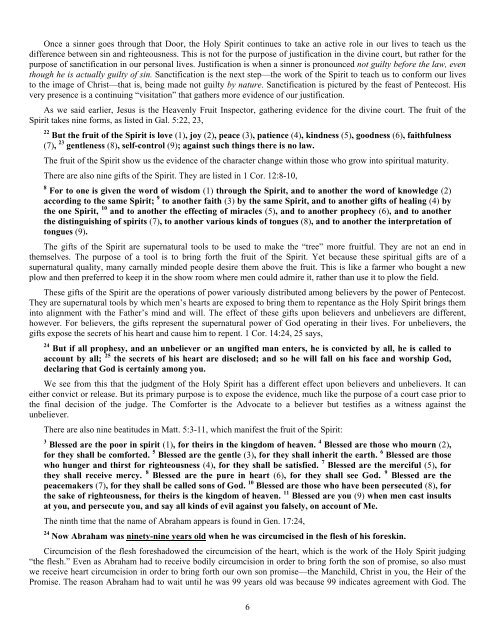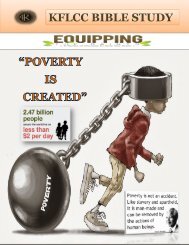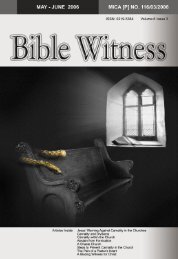Create successful ePaper yourself
Turn your PDF publications into a flip-book with our unique Google optimized e-Paper software.
Once a sinner goes through that Door, the Holy Spirit continues to take an active role in our lives to teach us the<br />
difference between sin and righteousness. This is not for the purpose of justification in the divine court, but rather for the<br />
purpose of sanctification in our personal lives. Justification is when a sinner is pronounced not guilty before the law, even<br />
though he is actually guilty of sin. Sanctification is the next step—the work of the Spirit to teach us to conform our lives<br />
to the image of Christ—that is, being made not guilty by nature. Sanctification is pictured by the feast of Pentecost. His<br />
very presence is a continuing “visitation” that gathers more evidence of our justification.<br />
As we said earlier, Jesus is the Heavenly Fruit Inspector, gathering evidence for the divine court. The fruit of the<br />
Spirit takes nine forms, as listed in Gal. 5:22, 23,<br />
22 But the fruit of the Spirit is love (1), joy (2), peace (3), patience (4), kindness (5), goodness (6), faithfulness<br />
(7), 23 gentleness (8), self-control (9); against such things there is no law.<br />
The fruit of the Spirit show us the evidence of the character change within those who grow into spiritual maturity.<br />
There are also nine gifts of the Spirit. They are listed in 1 Cor. 12:8-10,<br />
8 For to one is given the word of wisdom (1) through the Spirit, and to another the word of knowledge (2)<br />
according to the same Spirit; 9 to another faith (3) by the same Spirit, and to another gifts of healing (4) by<br />
the one Spirit, 10 and to another the effecting of miracles (5), and to another prophecy (6), and to another<br />
the distinguishing of spirits (7), to another various kinds of tongues (8), and to another the interpretation of<br />
tongues (9).<br />
The gifts of the Spirit are supernatural tools to be used to make the “tree” more fruitful. They are not an end in<br />
themselves. The purpose of a tool is to bring forth the fruit of the Spirit. Yet because these spiritual gifts are of a<br />
supernatural quality, many carnally minded people desire them above the fruit. This is like a farmer who bought a new<br />
plow and then preferred to keep it in the show room where men could admire it, rather than use it to plow the field.<br />
These gifts of the Spirit are the operations of power variously distributed among believers by the power of Pentecost.<br />
They are supernatural tools by which men’s hearts are exposed to bring them to repentance as the Holy Spirit brings them<br />
into alignment with the Father’s mind and will. The effect of these gifts upon believers and unbelievers are different,<br />
however. For believers, the gifts represent the supernatural power of God operating in their lives. For unbelievers, the<br />
gifts expose the secrets of his heart and cause him to repent. 1 Cor. 14:24, 25 says,<br />
24 But if all prophesy, and an unbeliever or an ungifted man enters, he is convicted by all, he is called to<br />
account by all; 25 the secrets of his heart are disclosed; and so he will fall on his face and worship God,<br />
declaring that God is certainly among you.<br />
We see from this that the judgment of the Holy Spirit has a different effect upon believers and unbelievers. It can<br />
either convict or release. But its primary purpose is to expose the evidence, much like the purpose of a court case prior to<br />
the final decision of the judge. The Comforter is the Advocate to a believer but testifies as a witness against the<br />
unbeliever.<br />
There are also nine beatitudes in Matt. 5:3-11, which manifest the fruit of the Spirit:<br />
3 Blessed are the poor in spirit (1), for theirs in the kingdom of heaven. 4 Blessed are those who mourn (2),<br />
for they shall be comforted. 5 Blessed are the gentle (3), for they shall inherit the earth. 6 Blessed are those<br />
who hunger and thirst for righteousness (4), for they shall be satisfied. 7 Blessed are the merciful (5), for<br />
they shall receive mercy. 8 Blessed are the pure in heart (6), for they shall see God. 9 Blessed are the<br />
peacemakers (7), for they shall be called sons of God. 10 Blessed are those who have been persecuted (8), for<br />
the sake of righteousness, for theirs is the kingdom of heaven. 11 Blessed are you (9) when men cast insults<br />
at you, and persecute you, and say all kinds of evil against you falsely, on account of Me.<br />
The ninth time that the name of Abraham appears is found in Gen. 17:24,<br />
24 Now Abraham was ninety-nine years old when he was circumcised in the flesh of his foreskin.<br />
Circumcision of the flesh foreshadowed the circumcision of the heart, which is the work of the Holy Spirit judging<br />
“the flesh.” Even as Abraham had to receive bodily circumcision in order to bring forth the son of promise, so also must<br />
we receive heart circumcision in order to bring forth our own son promise—the Manchild, Christ in you, the Heir of the<br />
Promise. The reason Abraham had to wait until he was 99 years old was because 99 indicates agreement with God. The<br />
6

















